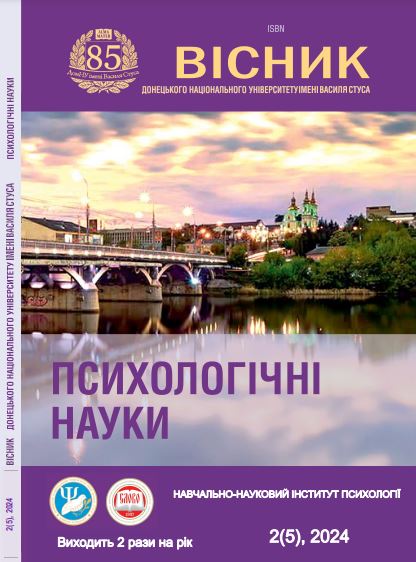Psychological resilience of young people in the context of military aggression
DOI:
https://doi.org/10.31558/2786-8745.2024.2(5).8Keywords:
individual psychological resources, psychological resilience, youth, war, stress, adaptationAbstract
The article discusses the concept of psychological resilience of young people in the context of military aggression. The study of psychological resilience of young people in war is critical to understanding how young people can adapt to difficulties and recover from trauma. In times of war, it is important not only to restore infrastructure, but also to support the younger generation that will shape the future The purpose of the study was to theorize and investigate the individual psychological resources of youth resilience during military aggression. In order to study the individual psychological resources of youth resilience, the following methods were used: The following methods were used in the study: S. Muddy's “Test of Resilience”, the multi-level personality questionnaire “Adaptability”, the PSM-2 psychological stress scale, the BASIC Ph.The study of the relationship between psychological stress and stress coping showed positive correlations between high levels of psychological stress and emotions, social ties and physical activity, indicating their role as stress coping strategies. The negative correlation between stress and cognitive functioning emphasizes that better cognitive abilities contribute to more effective adaptation to stress. Thus, strong faith, good social connections, developed imagination, and physical activity can reduce stress and improve psychological well-being. The results of the study indicate the importance of developing resilience and social support as a means of reducing stress among young people, which can have a positive impact on their learning and overall well-being. In general, the results of the study emphasize the need to support young people in developing adaptive mechanisms, improving mental resilience, and forming positive social norms to improve their integration into society.
References
Masten, A. S. Ordinary Magic: Resilience Processes in Development. American Psychologist. 2001. Vol. 56, No. 3. P. 227–238.
Яценко Т.С., Галушко Л.Я. Глибинна психокорекція та упередження психотравматизації. Київ: Вища школа, 2020. 234 с.
Максименко С.Д., Кісарчук З.Г. Психологічна допомога постраждалим внаслідок кризових травматичних подій. Київ: Логос, 2021. 207 с.
Ткач Б.М., Кудінова М.С. Нейропсихологія стресостійкості. Київ: Талком, 2021. 212 с.
Шевченко Н.Ф., Шевченко А.І. Психологічні ресурси особистості в умовах воєнного стану. Психологічні перспективи. 2023. Вип. 41. С. 210-222.
Бондар В.І., Макаренко І.Є. Психологічна резильєнтність особистості в умовах воєнного стану. Психологічний журнал. 2022. Т. 8, № 9. С. 9-17.
Корольчук В.М. Психологічні детермінанти стійкості особистості до дії стресогенних факторів. Проблеми екстремальної та кризової психології. 2013. Вип. 14. Ч. І. С. 153-192.

